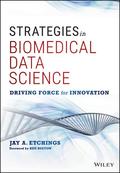Strategies in Biomedical Data Science
Driving Force for Innovation
SAS Institute Inc

1. Auflage März 2017
464 Seiten, Hardcover
Wiley & Sons Ltd
An essential guide to healthcare data problems, sources, and solutions
Strategies in Biomedical Data Science provides medical professionals with much-needed guidance toward managing the increasing deluge of healthcare data. Beginning with a look at our current top-down methodologies, this book demonstrates the ways in which both technological development and more effective use of current resources can better serve both patient and payer. The discussion explores the aggregation of disparate data sources, current analytics and toolsets, the growing necessity of smart bioinformatics, and more as data science and biomedical science grow increasingly intertwined. You'll dig into the unknown challenges that come along with every advance, and explore the ways in which healthcare data management and technology will inform medicine, politics, and research in the not-so-distant future. Real-world use cases and clear examples are featured throughout, and coverage of data sources, problems, and potential mitigations provides necessary insight for forward-looking healthcare professionals.
Big Data has been a topic of discussion for some time, with much attention focused on problems and management issues surrounding truly staggering amounts of data. This book offers a lifeline through the tsunami of healthcare data, to help the medical community turn their data management problem into a solution.
* Consider the data challenges personalized medicine entails
* Explore the available advanced analytic resources and tools
* Learn how bioinformatics as a service is quickly becoming reality
* Examine the future of IOT and the deluge of personal device data
The sheer amount of healthcare data being generated will only increase as both biomedical research and clinical practice trend toward individualized, patient-specific care. Strategies in Biomedical Data Science provides expert insight into the kind of robust data management that is becoming increasingly critical as healthcare evolves.
Acknowledgments xv
Introduction 1
Who Should Read This Book? 3
What's in This Book? 4
How to Contact Us 6
Chapter 1 Healthcare, History, and Heartbreak 7
Top Issues in Healthcare 9
Data Management 16
Biosimilars, Drug Pricing, and Pharmaceutical Compounding 18
Promising Areas of Innovation 19
Conclusion 25
Notes 25
Chapter 2 Genome Sequencing: Know Thyself, One Base Pair at a Time 27
Content contributed by Sheetal Shetty and Jacob Brill
Challenges of Genomic Analysis 29
The Language of Life 30
A Brief History of DNA Sequencing 31
DNA Sequencing and the Human Genome Project 35
Select Tools for Genomic Analysis 38
Conclusion 47
Notes 48
Chapter 3 Data Management 53
Content contributed by Joe Arnold
Bits about Data 54
Data Types 56
Data Security and Compliance 59
Data Storage 66
SwiftStack 70
OpenStack Swift Architecture 78
Conclusion 94
Notes 94
Chapter 4 Designing a Data-Ready Network Infrastructure 105
Research Networks: A Primer 108
ESnet at 30: Evolving toward Exascale and Raising Expectations 109
Internet2 Innovation Platform 111
Advances in Networking 113
InfiniBand and Microsecond Latency 114
The Future of High-Performance Fabrics 117
Network Function Virtualization 119
Software-Defined Networking 121
OpenDaylight 122
Conclusion 157
Notes 157
Chapter 5 Data-Intensive Compute Infrastructures 163
Content contributed by Dijiang Huang, Yuli Deng, Jay Etchings, Zhiyuan Ma, and Guangchun Luo
Big Data Applications in Health Informatics 166
Sources of Big Data in Health Informatics 168
Infrastructure for Big Data Analytics 171
Fundamental System Properties 186
GPU-Accelerated Computing and Biomedical Informatics 187
Conclusion 190
Notes 191
Chapter 6 Cloud Computing and Emerging Architectures 211
Cloud Basics 213
Challenges Facing Cloud Computing Applications in Biomedicine 215
Hybrid Campus Clouds 216
Research as a Service 217
Federated Access Web Portals 219
Cluster Homogeneity 220
Emerging Architectures (Zeta Architecture) 221
Conclusion 229
Notes 229
Chapter 7 Data Science 235
NoSQL Approaches to Biomedical Data Science 237
Using Splunk for Data Analytics 244
Statistical Analysis of Genomic Data with Hadoop 250
Extracting and Transforming Genomic Data 253
Processing eQTL Data 256
Generating Master SNP Files for Cases and Controls 259
Generating Gene Expression Files for Cases and Controls 260
Cleaning Raw Data Using MapReduce 261
Transpose Data Using Python 263
Statistical Analysis Using Spark 264
Hive Tables with Partitions 268
Conclusion 270
Notes 270
Appendix: A Brief Statistics Primer 290
Content Contributed by Daniel Peñaherrera
Chapter 8 Next-Generation Cyberinfrastructures 307
Next-Generation Cyber Capability 308
NGCC Design and Infrastructure 310
Conclusion 327
Note 330
Conclusion 335
Appendix A The Research Data Management Survey: From Concepts to Practice 337
Brandon Mikkelsen and Jay Etchings
Appendix B Central IT and Research Support 353
Gregory D. Palmer
Appendix C HPC Working Example: Using Parallelization Programs Such as GNU Parallel and OpenMP with Serial
Tools 377
Appendix D HPC and Hadoop: Bridging HPC to Hadoop 385
Appendix E Bioinformatics + Docker: Simplifying Bioinformatics Tools Delivery with Docker Containers 391
Glossary 399
About the Author 419
About the Contributors 421
Index 427


